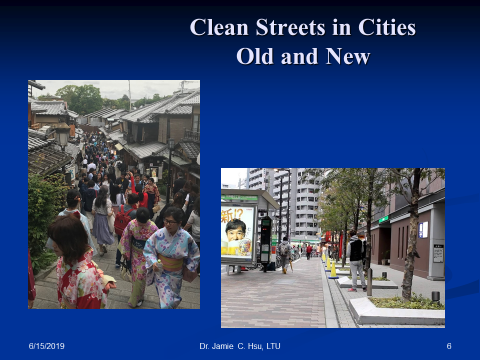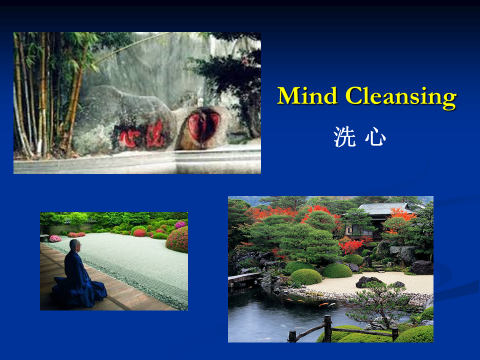
Street Cleaning and Mind Cleansing
– Musings of Dr. Jamie Hsu, 5.31.2019
During our 50th anniversary vacation in Japan, we enjoyed warm friendship, marvelous food, and splendid scenery. Among the bustling city, hustled lives, beautiful gardens, and majestic temples and shrines, I noticed something very interesting: There are hardly any garbage cans in the streets, but there are many zen gardens scattered throughout the metropolitan areas of Tokyo, Osaka, and Kyoto.
In the miles of streets we walked, it was difficult to find a garbage can to dispose of our snack and drink containers. We had to put the trash in our pockets or purses for later disposal. With this inconvenience, no wonder it is uncommon for Japanese people to eat while walking or riding a train. Contrary to my intuition, the streets are actually cleaner. There is no litter and no piled-up garbage cans. A lesson learned for me.
Another interesting phenomenon is the popularity of zen gardens and temples throughout the city. People young and old will casually stroll through the places or sit quietly to observe the garden and meditate. I like that they call this practice “Mind Cleansing,” or literally, “洗心 wash your heart.” In front of these gardens and temples, there is always a water fountain for visitors to wash their hands, mouth, and garden ladle. The ritual of feeling the gentle flow of water was very soothing for me. I just wish I had more time to meditate in the garden to truly experience mind cleansing.
During those ten days in Japan, I realized Japan is a country of contrast. As an automotive executive, I have spent a lot of time learning about the Toyota production system. In that regard, Japan is a country of extreme efficiency. But the country’s culture encourages a slower pace for protocols and ceremonial rituals — the bowing salespeople in shopping malls, the lengthy tea ceremonies, the long and proper manners in serving meals, and the sophisticated language used in greetings.
I hope the beauty of traditional rituals and the efficiency of the modern world can co-exist in Japan and make people’s lives better and more fulfilling.


洗心的體驗
-作者 許俊宸博士
-中譯 薛乃綺
在日本度假慶祝结婚50周年之際,我們享受了溫暖的友誼、美好的食物、以及令人讚嘆的景致。在繁華的城市、熙熙攘攘的生活、美麗的花園與雄偉的寺廟与神社中,我注意到一些非常有趣的事情:在東京、大阪以及京都這些大都會區裡,街道上幾乎都沒有垃圾桶、但是却遍佈著諸多的寺廟與花園。
在我們走過的幾英里的街道上,很難找到一個垃圾桶來丟棄吃完的零食跟飲料罐。我們不得不把垃圾暫時先放在自己的口袋或包包裡,等下再來處理。我想就是因為這樣的「不便」,也難怪很少看到日本人在走路或搭車時邊吃東西。跟我的直覺不同,街道反而因此更加乾淨,沒有垃圾、也沒有堆積垃圾的垃圾桶。這讓我學到了一課。
另一件有趣的事情就是,寺廟跟花園遍佈整個城市。不管是年輕人或老年人,都會在這些地方隨意散步、或者靜靜地坐在那裏看著這些花園沉思。我很喜歡他們把這樣的作法稱之為”心靈的洗滌”,字面上的意思就是”洗心”。在這些花園和寺廟的前方,總有一個噴泉供遊客洗手臉和竹杓。對我來說,感受這種溫和的水流儀式是非常舒適的;只希望能有更多時間在花園裡冥想,真正體驗”洗心”。
在日本的那十天裡,我意識到這是一個對比鮮明的國家。作為車輛產業的高階主管,我曾花了許多時間去了解豐田汽車的生產體系。在這個方面,日本是一個效率極高的國家。然而,她的文化卻鼓勵以緩慢的節奏作為禮節與儀式的步調;譬如,有许多排队鞠躬的销售员,繁复的茶道,一道一道的饮食,和会谈中穿插的一连串客气话语。
希望傳統禮儀之美與現代世界的效率能持續在日本共存,讓人們的生活更美好、充實,清静。


